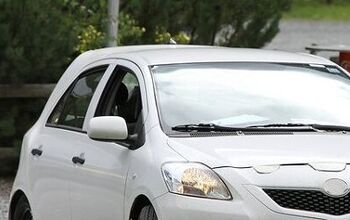Are Europe's Diesel Days Coming To An End?
American auto enthusiasts often bemoan the lack of diesel options offered on the US market, looking to Europe as the promised land of oil-burning efficiency. But Europe’s love affair with diesel, which has been manifested in a 50%+ diesel sales mix for years, may be coming to a close. The WSJ reports
The European Commission–which has executive powers in the European Union–will propose to levy a minimum EUR20 per metric ton of carbon dioxide emitted on products like gasoline, diesel, natural gas and coal starting in 2013. But it will also propose adjusting the existing legislation by gradually increasing a minimum levy on the energy content of diesel to bring it to the same level as that of gasoline starting in 2018
Here’s the key: in addition to basing taxes on C02 emissions, the EU tax structure shift will result in fuel taxation based on energy content rather than volume alone. Accordingly, diesel’s higher energy content means it will see a more dramatic increase in taxation levels. And this single common-sense proposal is unleashing an intense debate in Europe about energy, taxation and the future of the auto industry.
The hydrocarbon industry is one of the few European stakeholders to come out in support of the European Commission’s proposal, telling the WSJ
It is important to balance taxation for all energy sources to create a level playing field and technology neutral approach for all energy products. Taxing each energy product on its merits–its energy content and CO2 emitted while used, will encourage intelligent choices of energy products based on their efficiency rather than on their favourable taxation
After all, one of the Commision’s goals for energy tax reform is to help the European refining scheme. In order to produce enough diesel for the European market, refineries must produce excess gasoline which it then sells (at little profit) to the US. The European auto industry, on the other hand, is much less enthused about the Commission’s proposal for a Europe-wide tax scheme. A spokesperson for the ACEA, Europe’s automaker association complains
EU manufacturers are world leaders in clean diesel technologies and have invested quite a bit in it. If the market share of diesel would now decrease, that could be counterproductive
And like all EU regulation, the potential creation of economic winners and losers with this proposal is creating political problems, pitting automaking nations like Germany against Brussels and its supporters. As the home of three automakers with a global reputation for diesel technology, Germany’s government is taking the lead in opposing the proposed energy tax reform. Economic Minister Rainer Brüderle dismisses the very notion of an increase in diesel taxes in Autobild, threatening a German veto of any such proposal. German Transport Minister Peter Ramsauerwas even more specific in thelocal.de, saying
The regulatory frenzy from Brussels must have an end. That means hands off the diesel tax. Relief through a hike in commuter tax breaks or cuts in the green tax really have to be discussed. Otherwise, motorists will revolt.
But the European Commission insists that its proposal is not intended to penalize diesel, but simply to put Europe on a single, fair energy standard. After all, as Ferdinand Dudenhöffer from the Center for Automotive Research at the University of Duisburg-Essen points out to Deutsche Welle
Because of generous diesel subsidies, nearly 48 percent of German cars and more than 60 percent of Austrian cars are powered by diesel. In Switzerland, where no such subsidy is in place, only about 20 percent of the cars run on diesel
By standardizing taxation on energy content lines, Dudenhöffer and the European Commission argue that Europe’s diesel mix will be determined by market forces across the Union, rather than by subsidies on a country-by-country basis. And, for all of Germany’s advantages in diesel technology, the current tax structure has helped its automakers ignore revolutions in gas-hybrid technologies. Besides, as EC spokesman David Boubli tells EUobserver,
big prices changes are unlikely as many national governments already set diesel taxes which are above the EU minimum.
Reacting to German news reports that the country’s diesel prices would rise, Boublil said: “The current minimum at the EU level for diesel is €330 per 1000 litres … [whereas] in Germany the current minimum is €470 per 1,000 litres.”
“The future minimum [based on Wednesday’s proposals] will be closer to the current minimum than to what is applied in Germany now.”
The diesel debate is far from over, and will likely generate more controversy before it is resolved. But if the tax reform passes, Europe’s decades-long love affair with diesel could draw to a close. And since few other markets have supported diesel to the same extent, a resulting move away from diesel technology by the German automakers could radically affect the availability of diesel-powered passenger cars around the world. If Europe turns away from diesel, the world might just follow suit.
More by Edward Niedermeyer
Latest Car Reviews
Read moreLatest Product Reviews
Read moreRecent Comments
- Fahrvergnugen That is SO lame. Now if they were willing to split the upmarketing price, different story.
- Oberkanone 1973 - 1979 F series instrument type display would be interesting. https://www.holley.com/products/gauges_and_gauge_accessories/gauge_sets/parts/FT73B?utm_term=&utm_campaign=Google+Shopping+-+Classic+Instruments+-+Non-Brand&utm_source=google&utm_medium=cpc&hsa_acc=7848552874&hsa_cam=17860023743&hsa_grp=140304643838&hsa_ad=612697866608&hsa_src=g&hsa_tgt=pla-1885377986567&hsa_kw=&hsa_mt=&hsa_net=adwords&hsa_ver=3&gad_source=1&gclid=CjwKCAjwrIixBhBbEiwACEqDJVB75pIQvC2MPO6ZdubtnK7CULlmdlj4TjJaDljTCSi-g-lgRZm_FBoCrjEQAvD_BwE
- TCowner Need to have 77-79 Lincoln Town Car sideways thermometer speedo!
- Kjhkjlhkjhkljh kljhjkhjklhkjh I'd rather they have the old sweep gauges, the hhuuggee left to right speedometer from the 40's and 50's where the needle went from lefty to right like in my 1969 Nova
- Buickman I like it!

































Comments
Join the conversation
When are Europeans going to get a handle on their out of control leaders? Higher fuel taxes will not have the effect of minimizing fuel consumption. Instead, it will have the affect of driving up the cost of consumer goods.
Power to tax is power to destroy.